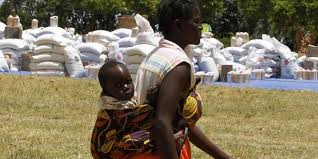The word violence is related to the Latin word “violare” which means breaking, and it is an unauthorized physical strength exercise (Lewis and Short, 1994). Violence against women is a negative phenomenon throughout the world from ancient times. Zimbabwe has a hostile environment for women and girls. This paper examines the aspect of domestic and political violence against women and girls in Harare, Zimbabwe.
The study used a qualitative approach to uncover the existential nature of gender and violence in Zimbabwe. Primary Data was gathered through a semi-structured in-depth telephone interview and focused group discussion (FGD) of the informant chosen using snowball techniques. The research has 10 informing on online-focused group discussions between the ages of 22-47 and 15 informants for an in-depth online interview. The informant is the woman and daughter of Harare, who is the victim of political and household violence.
The results of the study of interviews and focused group discussions (FGD) have shown that women are the most victims of political motivation and domestic violence. The phenomenon of violence against women in Zimbabwe has a lot of impact on women and girls. Several women have identified the political environment of the time and the patriarchy culture as the only factor in the brutality of women in Zimbabwe. In Zimbabwe, rape used to correct and discipline women who took part in the political sphere, especially on the opposition party. Therefore, the proliferation of violence against women and girls by security forces in Zimbabwe, in particular, Harare describes continuing human rights violations.
From a directional group discussion, it is noted that despite the efforts of the gender mainstreaming in Zimbabwe, women’s rights are still being ruled out because all departments and institutions are dominated by a ruling political party that seems to have mushed all fields in Zimbabwe. Politic motivated violence against women in Harare Zimbabwe is prevalent. It is viewed as a tool used to silence and intimidate the different voices and suppress women to participate against the government. The results showed that despite the efforts of gender mainstreaming in Zimbabwe, women’s rights were still being ruled out because all departments and institutions were dominated by a ruling political party that seemed to have mushed all fields in Zimbabwe.
From the data analysis, it can be noted that women and girls have become prey to the repressive state apparatus such as soldiers and police in Zimbabwe. Violence in Zimbabwe has been triggered by the weakening of the state and the rule of law. The judiciary is supposed to protect the interests of citizens, and eradicate injustices is the one who commits terrible actions against these women and girls. The state has been involved in various campaigns of violence, intimidation, rape, assault and even murder of women and girls (Bird and Prowse 2008, Moyo 2013, Manyonganise 2017). Still, violence against women and girls remains a serious problem. Soldiers and police officers who are supposed to uphold peace and law are the ones that are found to perpetuate violence against women and girls. Over the last few decades, the government of Zimbabwe has been known for violating human rights, especially the rights of women and girls.
In conclusion, people can note that gender-based violence and political-motivated violence have been present in our communities since ancient times. As such, it has many negative impacts on women and girls, especially in Harare and Zimbabwe in general. This article argues that the state authorities of the Zimbabwe Defence Forces (ZDF) and the Police of the Republic of Zimbabwe (ZRP) and all government agencies are continually committing violence against women and girls. Although all women in Harare, Zimbabwe were not politically violated, this paper argues that after decades of such behavior were forgiven and promoted. Political culture has hardened with the acceptance of violence against women and girls who have been embedded and widespread.
It takes transformational leadership that will combine participation, transparency, challenging existing strengths, horizontally, inclusive, comprehensive, and consultative in the existential needs of men, men, women, and girls. It will help in respecting human rights, gender equality, and women’s empowerment.
Author: Maybe Zengenene and Emy Susanti
Link:
Violence against Women and Girls in Harare, Zimbabwe Journal of International Women’s Studies Volume 20, Issue 9. Gender Relations, Equality, and Inclusion in Indonesia: Contradictions, Complexity, and Diversity





